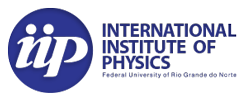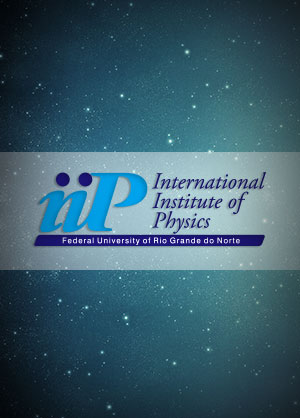Please be aware that the International Institute of Physics, IIP, never contacts the participants to ask for credit card or similar information. Participants are expected to pay for their travel and accommodation by themselves unless they qualify for financial support. If you have any questions, please contact IIP events department at events@iip.ufrn.br
Advances in Quantum Technology: From Quantum Information to Quantum Devices
Directors:
Chair: Pasquale Sodano, International Institute of Physics (Natal, RN, Brazil)
Sougato Bose, University College London (London, UK)
Christiane de Morais-Smith, University of Utrecht (Utrecht, The Netherlands)
Andrea Trombettoni, CNR-IOM and SISSA (Trieste, Italy)
Workshop fees:
Students = USD 170,00 / €140,00 / R$ 300,00
Professionals = USD 270,00 / €220,00 / R$ 500,00
Payment must be made in cash on the first day of the School in one of the currencies listed above.
Applications to the Conference may be submitted until August 10 2012.
For any inquiries about the program please contact one of the Directors of the Conference.
The Conference addresses recent theoretical and experimental results concerning the engineering of quantum states implementable in selected condensed matter systems, with an eye on the applications to solid state realization of qubits and quantum devices enabling to implement quantum protocols. Particular attention will be given not only to the analysis of the new quantum states emerging in pertinently engineered quantum devices and new materials but also to relevant results obtained in investigations on long distance quantum entanglement, quantum state transfer and topological quantum computation with the aim of pointing to the most promising devices for the experimental realization of these quantum protocols.
New quantum states may emerge- for instance- as a result of the pertinent engineering of a quantum device (such as: superconducting Josephson networks with impurities, optical devices, ultracold atoms, quantum dots) or in “new materials” (such as graphene, topological insulators and superconductors). The interest in these new states is further increased by the huge progresses of the last years in the creation and control of mesoscopic systems displaying macroscopic quantum coherence. Furthermore, it is by now becoming evident that many features of such quantum devices and materials may be explained using methods developed in modern field theories and string theory. Part of the workshop will be also devoted to a review of these methods.
The Conference is intended not only for graduate students and young post doctoral fellows involved in researches at the interface between condensed matter (and/or cold atoms) and quantum information theory, but it is also aimed at providing an arena where theoretical and experimental physicists may meet in order to stimulate a synergy to face the challenging task of engineering new quantum settings where quantum information protocols can be implemented.
The Program foresees a series of minicourses (3-4lectures of 45 min. each) to be delivered mainly in the first week of the conference and a series of invited research seminars (45 min.) to be delivered mainly in the second week of the conference. Participants are encouraged to attend both weeks and are encouraged to present the results of their research either as a short (20 min.) talk or as a poster in one of the two planned poster sessions.
The minicourses will focus on:
Dirac and Majorana zero modes in condensed matter systems and quantum devices;
Superconducting Quantum Devices;
Quantum Devices and Quantum Simulation of Condensed Matter Systems with Cold Atoms;
Quantum Interferometry;
Quantum Devices with Impurities;
Topological insulators and superconductors;
Topological Order and Topological Quantum Computing;
Entanglement in many body systems.









